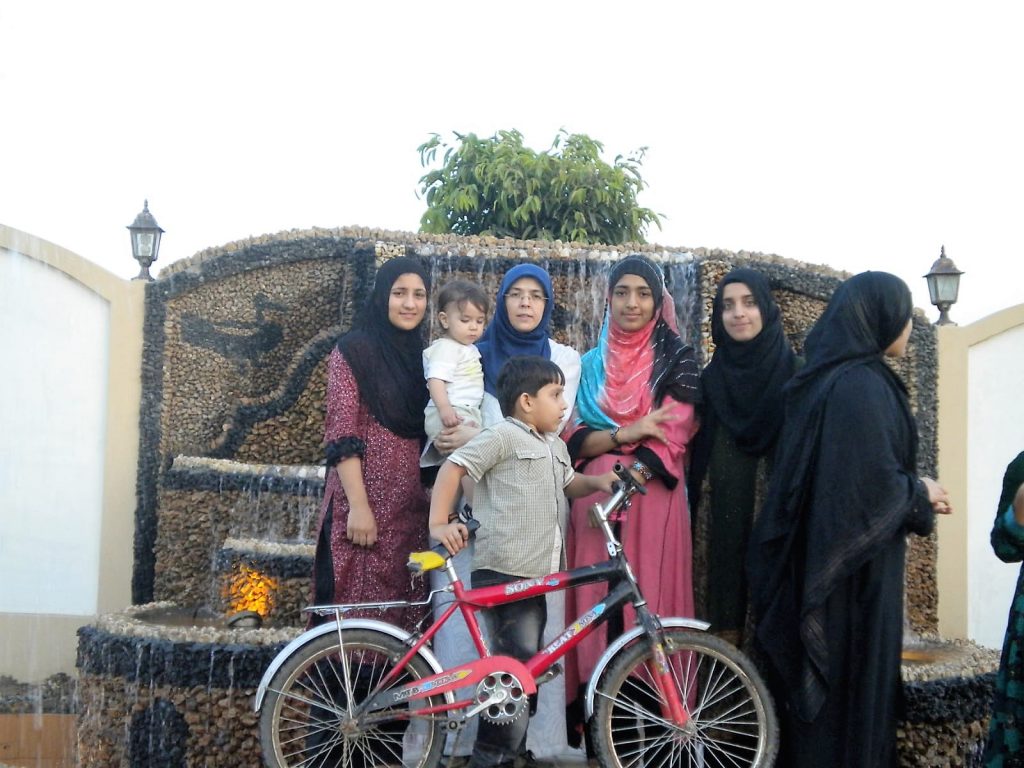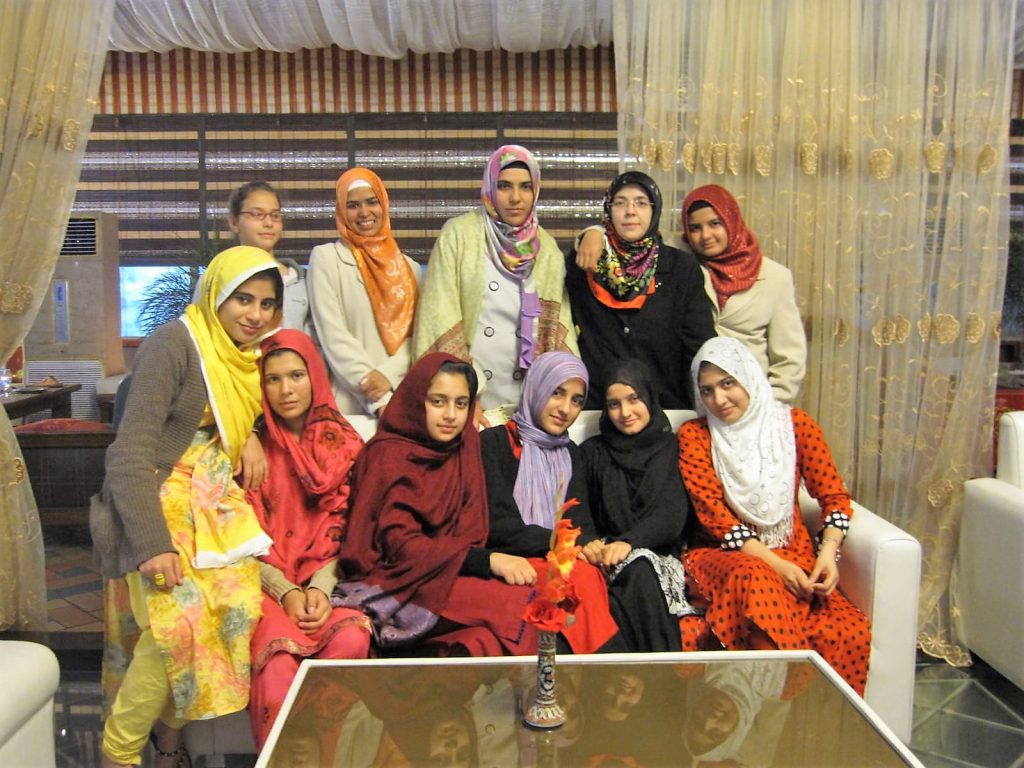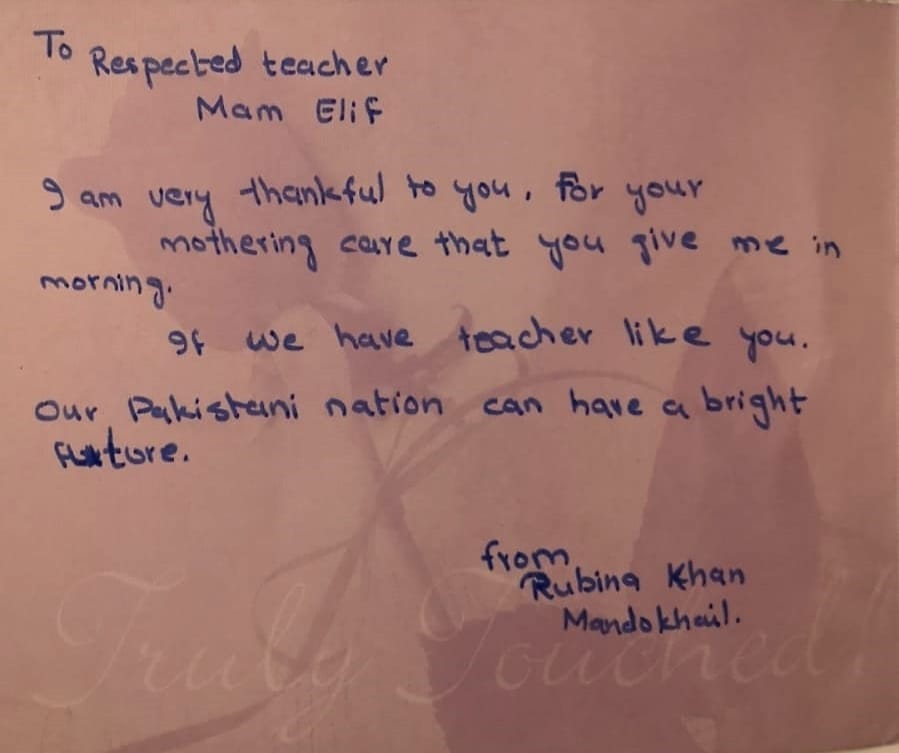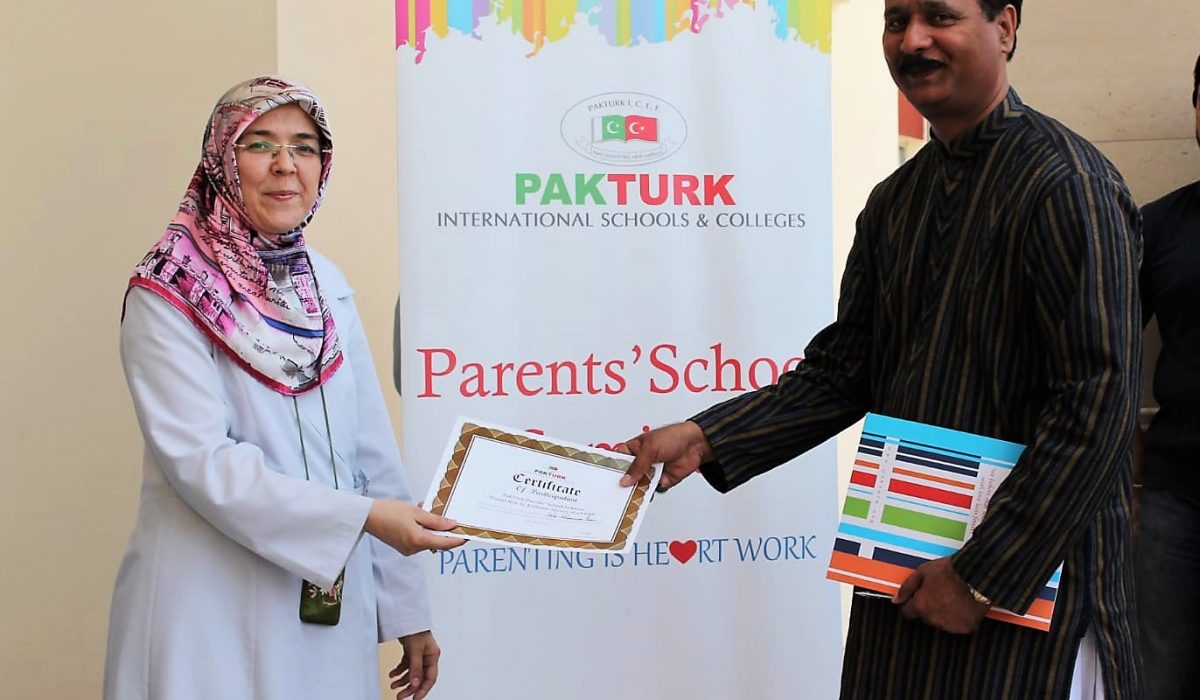English teacher Elif Köken: The harmony, alliance and affection among our friends begot abundance

Opening of the first hostel in Lahore
July 26, 2021
The hard work and harmony of the students warmed our hearts
July 29, 2021Elif Köken, who belongs to a family of immigrants from Greece living in Balıkesir, was 22 years old when she decided to migrate voluntarily with the intention of serving for the sake of Allah. Her journey, which started with Uzbekistan, continued with Pakistan after Thailand. She was first a university student and a teacher in Pakistan where she lived for 11 years. She also organized various social activities with different youth and women’s groups.
We talked to Elif Köken, who currently lives in Germany with her family, about the years in Pakistan which she cherishes as “the best time of our lives.” While describing the positive impacts of the educational activities in Pakistan on students and teachers, Elif Köken draws attention to a very significant value: “We conducted our activities with friends there in such a beautiful spirit of harmony, alliance and affection that it definitely helped the works gain abundance.”
Could you briefly describe your life before going to Pakistan?
I was born in Diyarbakır in 1973, where my father was posted on duty. I am originally from Balıkesir. I belong to a family of immigrants who migrated from Greece to Turkey during the population exchange.
How and when did you decide to go to Pakistan?
Actually, my first trip abroad was to Uzbekistan. I got married in 1995 and went to Uzbekistan. Later, I moved to Thailand and from there to Pakistan in 2003 with my husband and two daughters. Since we had already been abroad, my family did not object in any way.
What kind of preparations did you make before you set off? May you share your feelings and thoughts during that process?
My mood on the way to Pakistan was complicated. I was going to a sister country but I knew, in terms of country conditions, there would be lacks as compared with Turkey. (Moreover, it is not easy to move from one country to another. You can carry limited items with yourself only.) Actually, I felt like I was going to Uzbekistan for the first time (those who watched the Turkish movie Birleşen Gönüller (Uniting Hearts) know the country conditions in that geography during those years). I more or less knew the conditions, but there was nothing to stop me from going there. Most importantly, while learning the culture of the new places I visited, I would share my own values and thus be able to do something for others.
What were your first impressions of Pakistan?
We landed in Lahore, Pakistan in March 2003. It was a rainy night. The airport where we landed seemed different with its terminal building as large as an intercity bus station, showing the general conditions of the country in those years. As soon as my husband dropped us off at our accommodation, he set off for another city to attend to an educational meeting. My husband wished to go and rent a house shortly. However, unfortunately, he could not find a house as we hoped. Eventually, we stayed at the house of a teacher colleague we first met when we arrived in Pakistan. My dear friend Serpil – I love her very much – hosted us in her house for three weeks. Glad that we stayed with them. It was not only the beginning of an exquisite friendship; she also became our lifeline in our first days in a new country about which we knew nothing. If you have the opportunity to meet veteran friends when you first go to a new place, it is a priceless blessing. It helps a lot in getting used to the new place and conditions. Otherwise, it takes time to get used to and get to know others, and that duration can spell an ordeal for anyone.
PAKISTANIS SAY, ‘LAHORE, LAHORE HAIN’
For me, the bond I form with people is more important than the conditions in a new place. Within the week of our arrival there, we attended a tea party and had the opportunity to meet female friends living in Lahore. That made me very happy.
Lahore is a very beautiful historical city. Pakistanis say, “Lahore, Lahore hain”. That is, Lahore is Lahore. It is a city which once served as an imperial capital. Our house and the neighbourhood where we lived was beautiful.
What did you do first? What job did you start?
I was a high school graduate when I went abroad. I could not attend to the university because of the headscarf ban in Turkey. Before getting married, my husband had promised to support me when I had told him that I wanted to study abroad. Since our children were born in Thailand, I did not have an opportunity to study there. As soon as I arrived in Pakistan, I started searching universities. While I was about to take admission at the Kinnard College in Lahore, we were posted to Islamabad. I had heard of the National University of Modern Languages in Islamabad and was happy to move to that city. I wanted to study in an English degree program. My eldest daughter was old enough to attend to the first year of the primary school and my younger daughter at the kindergarten age. Since the timings of the university would not affect our daily routine and prevent me from taking care of the children, I started the university through the support of my husband.
At the university, we organized several activities promoting the Turkish culture with the students from Turkey who had their education there. I used to organize the activities of the student groups thanks to my age and my experience abroad. In fact, with regards to education and career, I first became a mother and then attended to a university. Before I attended to the university, I had worked in different youth projects to contribute to social development. After my graduation, through the experience I gained at my degree program and thanks to the volunteer work and social activities I had previously done with students, I started working at the PakTurk Girls High School in Islamabad as an English teacher and the Vice Principal in charge of Guidance and Counselling.

How long did you live in Pakistan? What duties did you perform in which cities?
Pakistan marked the best time of our lives where we and our children spent 11 years. I participated in activities with women and, since I attended to the university there, we also worked on intercultural dialogue with the youth. In addition, we used to hold cooking classes on Saturdays with the participation of women professionals like medical doctors and teachers. We used to read books and cook food from the Turkish cuisine together. The participants would learn how to cook the Turkish meals, pastries and pastry-style treats. They loved these very much.
THEY USED TO ASK THE TURKISH TEACHERS, ‘ARE YOU SIBLINGS?’
We used to conduct our activities among friends in such an exquisite harmony, alliance and affection that it definitely added abundance into the works done. For example, whenever we held a cooking class, a certain someone would read from a book and steer the discussions, but we would always prepare the treats together. Pakistani friends admired that conduct. They used to ask, “Are you siblings?” Some would set the table, some would bring the plates, and some would take care of their friends’ toddlers. Alliance and harmony surely enrich the works done and increase their value.
What kind of changes happened in your life during your stay in Pakistan? Do you have any unforgettable memories?
Our third child, Muhammed Mirza, was born in Pakistan. Mirza is a very generic name. It belongs to a famous poet, Mirza Ghalib, in the Subcontinent. It is also a name used in Turkey and the Balkans. In that sense, this name brings good memories to mind.
We made good friends in Pakistan. After graduating from the university, I started working at the school. We made good activities with our students. We are still in touch with our friends from there. We used to visit one another on every Eid, holiday and weekend. In fact, we used to visit our friends directly on the first day of every Eid.
As all Turkish nationals we would first come together at the school on every Eid, do activities with our children, and later go to visit our Pakistani friends. All of us used to experience that Eid spirit together. That’s why I’m still looking for the Eids in Pakistan. I am currently living in a European country, but the perception of the Eids there was different. Moreover, the months of Ramadan were very virtuous times. The tarawih prayers would be performed with the hatm (complete recitation of the Qur’an) in mosques during the holy month. We used to visit our friends at their homes to break our fast together. Pakistan is a beautiful and special place in that respect. One of the things that would catch my attention the most was the names of Allah Almighty written on plaques along the roads. It is everywhere. In fact, when entering the McDonalds, you may see a sign with “BismillaahirRahmaanirRaheem” on it. That used to come strange to us at first.
We used to get together with friends and neighbours and do readings, especially to benefit from the spiritual atmosphere of Fridays. I never forget: It was raining one evening. A school principal lived near our house. We wanted to visit her school and also wished to invite her to our school. She was surprised when we knocked at her door in the rainy weather. “It is very nice of you to come here in such a weather and extend an invitation to me. Your love of duty is praiseworthy. I am very impressed,” she had said.
What kind of a country is Pakistan, in your opinion? May you tell us about the aspects such as its people, culture, food, or else that affected you?
Pakistan is a very beautiful and wonderful country. It is friendly and brotherly. This friendship and mutual feelings date back to the time immemorial. There is a famous poem composed by Allama Muhammad Iqbal, the national poet of Pakistan. Moved by that poem Allama Iqbal recited on the ground where now Minar-e-Pakistan stands in Lahore, people did not leave the people of Ottoman Turkey alone during the War of Independence. Although they had meagre means, it was very striking that the people donated us all what they had; they stood by us and did not abandon us at that time. We used to say to our Pakistani friends and parents: “Now it’s our turn. We want to do whatever we can with a sense of loyalty and homage to the Pakistani society.” Of course, we were emotional while saying this. Such exchanges were moving for the people of both countries.
MY CHILDREN ENJOY WHEN I PREPARE PAKISTANI FOOD
As we witnessed during the recent ordeals, our parents and friends never abandoned us. People of Pakistan love us. Especially when we were checking in at the airport, the officials would ask us where we were from. Whenever we said ‘Turkey’ and that we worked at the PakTurk Schools, they would say ‘Alright’. They used to check our luggage, but also valued us as guests.

Pakistani culture is very entertaining and rich. The cuisine is delightful. I still like to cook Pakistani food. My kids love it too. We also love Thai food because we lived in different cultures. We also make Thai soup. In fact, when I cook those dishes, my children eat them with a festive mood.
How was your relationship with your students and their families? May you tell us about the reflections and impacts of the social, cultural and spiritual activities you did together?
Our relationship with the parents was very prolific. They had full confidence in us. They liked our school. We used to say to the parents: “We are a two-winged school. With applied sciences, we endeavour to inculcate moral values in our students. Hence, we assist them to take wings and soar.” Parents were happy when they were told about our vision this way. In Pakistan, there are also schools opened by various European countries. There, students receive education while alienated from their own culture. I had an example to this. One of our university professors had narrated us an incident. His own niece returned home from school one day. One of her parents was Punjabi and the other was from another province. The parents spoke their native language at home. Urdu is the official language of Pakistan, but everyone also speaks their regional language like Sindhi or Pashto. When the child heard her parents talking in the local tongue, she asked them, “Why are you chatting in the maid’s language?” She was a child who simply went to a primary school, but she approached her family with a prejudice. That was very sad to me. In our schools, we used to emphasize, “You will learn English and Turkish here, but your mother tongue and the culture you belong to are very important. You have to develop them very well.” That’s why our relations with the parents and their outlook towards our system were very positive. We would visit the parents at their homes. That would make them very happy.
‘WITH TEACHERS LIKE YOU, PAKISTAN’S FUTURE IS VERY BRIGHT’
When it was time to enrol new students to our school, we used to visit various towns and villages to find students who could not access any study opportunity and conduct written and oral tests for merit scholarships among as many students as possible. We found very lovely and very valuable students for our school through those examinations. Students who were hesitant to even talk to us at first later enrolled in the school, stayed in the hostel, and learned English fluently. There were some orphan children and children whose fathers were martyred in military duty. I especially can never forget one of them. She did not talk much to us at first, but she was very smart. She started the school, stayed in the hostel, and improved her language skills. We aimed to contribute to the society in true sense. Our objective was to provide educational opportunities to the youth in Pakistan and in their own culture, with the essence to highlight their talents so that they should never look down on themselves as the citizens of a backward country. Alhamdulillah, I believe we could achieve that. This was why we had no communication breakdown. Our students loved us and we loved them too. We held several activities like bake sales, science fairs, etc. Our students developed various projects. We used to sell the food prepared by the students at the charitable bake sales together. We had after-school study sessions. It was school subjects, entertainment and food merged as one. We had reading retreats during the summer holidays. Our students still remember those days and they ask us, “We miss you so much, won’t you come back?”
Did the feelings and ideas you had when you first went to Pakistan changed over time?

I knew more or less in what kind of a country I arrived, but while I was living and interacting with the people there, of course, I experienced different influences. I knew I arrived in a sister country. The most important thing for me was to meet and blend with the people there. I think we mutually managed that very well. If you already go to a country and live there, you have the opportunity to learn good things and form friendships. Otherwise, it is not enough to travel and see or read from a book. That’s why, I was fortunate to have lived in Pakistan. I’m glad I learned about the food and culture of that country. I was the vice principal in charge of guidance and counselling at the school. I used to organize various social activities. We periodically held meetings about student development. I was the form teacher of Grade 12. I used to assist students in planning their academic careers. All 12th graders used to sit for a test like the university selection and placement examination. One morning, during such an exam period, I saw a boarding student sitting on the stairs in the school. She had arrived early for the exam, so she was waiting. She was yet to have her breakfast. I said to her, “Let’s go to the canteen and get something. You should not take the exam without having your breakfast and a cup of tea!” That was how I took care of the student and sent her to the exam. When I left the classroom and came to my room at noon, I found a very nice card on my desk. In it were the beautiful words written by my student I had met in the morning. That made me very emotional. She had written, “As long as in Pakistan there are teachers like you who educate us with motherly sensitivity, the future of Pakistan will be very bright.”
MY DAUGHTER ATTENDS TO THE UNIVERSITY WHERE ALLAMA IQBAL RECEIVED HIS DOCTORATE
This is an unforgettable and a beautiful memory for me. We have a lot of memories, but even though it seemed like a small thing, it inspired me with this feeling: You take a step or offer a cup of tea, and a path opens to that student’s heart. Everyone will always see the result of the steps they take. Of course, the gist is not about ‘doing something in order to get rewards’. Everything that is done with sincerity and trueheartedness will definitely yield results. Maybe not at that moment and even though we may not personally yield benefits, we leave drops onto their hearts and minds; they are the students who will benefit Pakistan in the future. I think this is a very good incentive for teaching.
When and why did you leave Pakistan?
We left Pakistan after 11 years. It was time to go to newer places. We were very sad to leave because we spent our years there. Our children grew up there. They learned Urdu. They made good friends. They are still in contact with their friends. We also have friends with whom we still keep in touch.
Of course, we left a part of us there. That’s how we felt when we left Thailand. After Pakistan, we lived in Bosnia and Herzegovina for about a year. We now live in Germany.
How do you lead your life right now?
Here, I continue with my volunteer educational activities as usual. Meanwhile, there are projects for teaching German to the refugee children arriving from different parts of the world. We have tasks related to that project. I’m still teaching English; I am still catering to the children’s and students’ education. In fact, for a teacher, life has no meaning without students. Allama Muhammad Iqbal, one of the most important personalities in Pakistan, had received his Ph.D. from the Heidelberg University. When I came here and saw his name on a plaque, I was very surprised. I liked it as well. Currently, my daughter studies at Allama Iqbal’s alma-mater, Heidelberg University





No Comment.